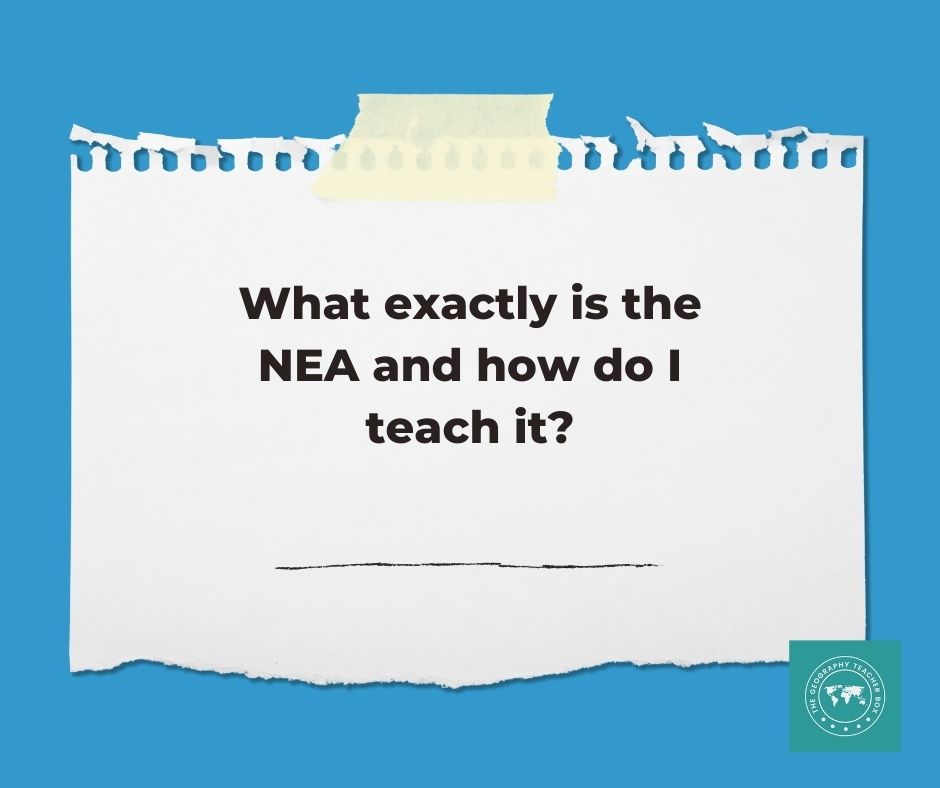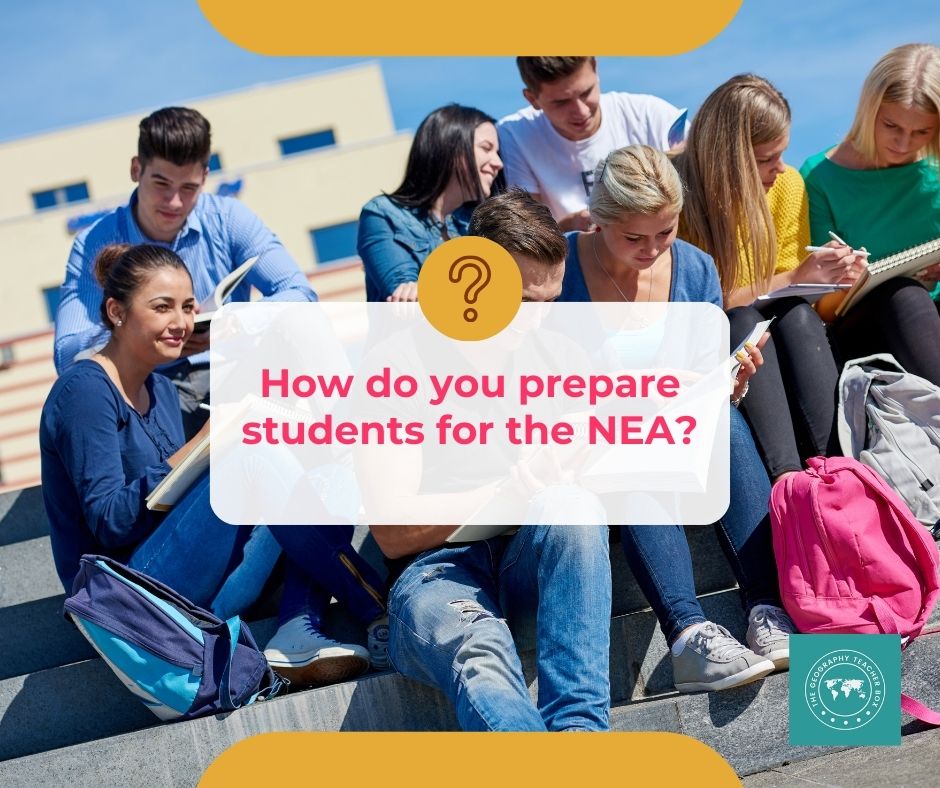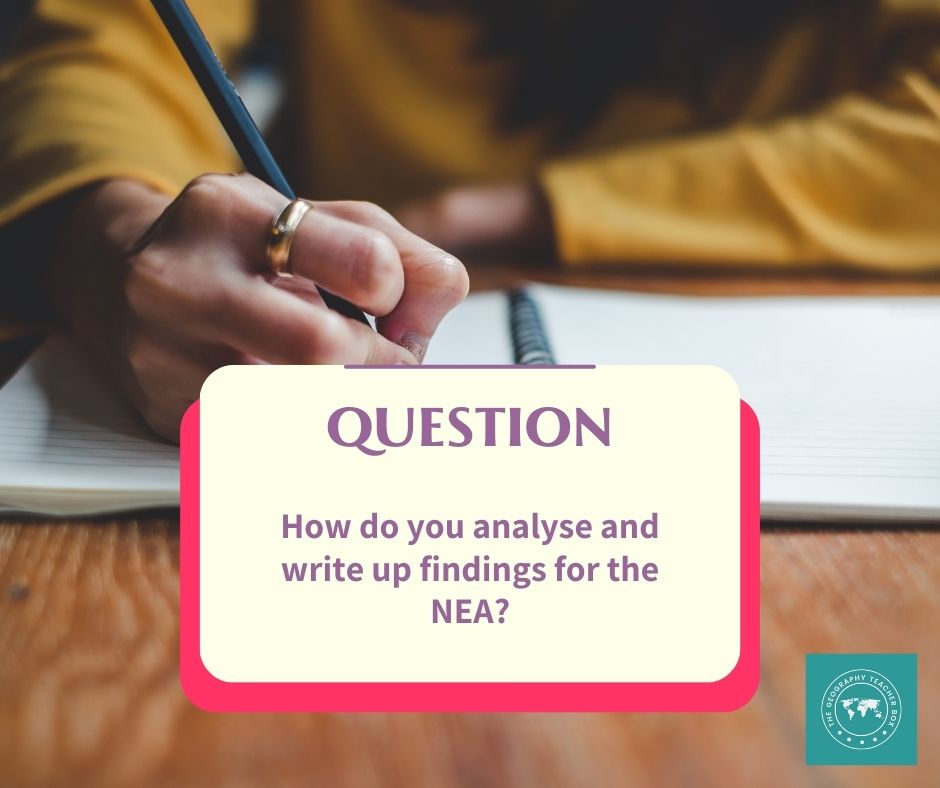Join the GTB vault and get a library of over 100 Q and A worksheets linked to geographical documentaries you can use in the classroom today!

Geogra3: Teaching the NEA
08/06/2023
I’m taking a slightly different approach today as I thought I would gather together some key thoughts and links for those of you starting to get students prepared for the Geography A-level NEA (non-examined assessment). Even if you don’t teach the NEA, I think some of these resources will be useful to you both in terms of planning and preparing fieldwork.
1. What exactly is the NEA?
A useful starting point is via the GEO online resources which provides both a powerpoint and tutorial from Bob Digby: https://geographyeducationonline.org/webinars/skills-boost/what-is-the-independent-investigation-all-about
You might also be interested in purchasing this book from Andy Owens: https://insightandperspective.co.uk/publications/a-level-geography-independent-investigation-a-practical-guide which provides practical step by step handbook to support each student as they prepare for, plan, execute their independent fieldwork investigation, and write up and submit their report.
Alternatively, there are a few books available on the Geographical Association shop such as "Fieldwork at A-level: your guide to the independent investigation" edited by Simon Oakes: https://portal.geography.org.uk/shop/view/P020624
You can also access CPD and feel more confident in your delivery of the NEA by attending a course provided by the Royal Geographical Society (RGS): https://www.rgs.org/events/autumn-2023/nea-grade-booster-workshop-for-teachers/
The RGS also has a lengthy student guide available on their website which can either be utilised in full or select specific sections for students to reference:
https://www.rgs.org/schools/teaching-resources/a-student-guide-to-the-a-level-independent-investi/ (scroll to the bottom of the page to access the downloads)

2. How do you get students prepared for the NEA?
It’s useful to remind students of the overall enquiry process first and I think the Field Studies Council provides a useful diagram that you can utilise and talk through: https://www.field-studies-council.org/resources/16-18-geography/route-to-enquiry/planning/
Then if you head over to Time for geography there are some great videos about 7 minutes each in length to help students get started, focusing on:
- How do you come up with an interesting research idea? https://timeforgeography.co.uk/videos-list/human-geography-research/research-idea/
- What makes a good research question? https://timeforgeography.co.uk/videos-list/human-geography-research/research-question/
- How do you choose the right research methods? https://timeforgeography.co.uk/videos-list/human-geography-research/how-do-you-choose-methods-research/
- What ethical considerations do I need to make? (particularly for human research) https://timeforgeography.co.uk/videos-list/human-geography-research/what-ethical-considerations-do-i-need-make/
I would also guide students to think about their literature review by using this resource also from Andy Owens: https://docs.google.com/presentation/d/1U5e41OASNqHnr34sD3msxOeIIvB0D4Mp/copy
OR this resource from GEOnline: https://geographyeducationonline.org/a-level/geographical-skills-and-enquiry/the-a-level-independent-investigation-literature-review

3. What resources are available to help students collect data?
It’s a good idea to get students thinking about sampling techniques and this resource from GEOline is helpful for that: https://geographyeducationonline.org/a-level/geographical-skills-and-enquiry/sampling-data-in-fieldwork
My go-to resource for data collection sheets has got to be The Island Geographer and you can find a whole collection here: https://www.theislandgeographer.co.uk/copy-of-using-gis-in-nea
Elsewhere, the Fieldstudies Council has a collection of resources linked to methods for research into coasts, glaciation, water and carbon cycle and place, as well as utilising GIS. These can be found here: https://www.field-studies-council.org/resources/16-18-geography/
Time for Geography also has videos on how to actually collect data for physical fieldwork:
https://timeforgeography.co.uk/video-collections/physical-geography-fieldwork/

4. What about writing up the whole thing?
There are two useful videos on GEOnline again from Chloe Searle, the Island Geographer:
Presenting data: https://geographyeducationonline.org/webinars/skills-boost/presenting-fieldwork-data
Analysing the data: https://geographyeducationonline.org/webinars/skills-boost/analysing-fieldwork-data
Time for Geography has a useful resource about analysing human geography specifically: https://timeforgeography.co.uk/videos-list/human-geography-research/human-geography-data-analysis/
I would also reference back to the guidance in the RGS student booklet for greater detail on specific analysis techniques, formulating conclusions and the evaluation (section 4, 5 and 6): https://www.rgs.org/schools/teaching-resources/a-student-guide-to-the-a-level-independent-investi/

5. Is there anything else to be aware of?
A video from The Curious Geographer and The Island Geographer explains the common mistakes students make in the NEA and how to avoid them:
I really hope that has been useful to you - let me know what you think or if I've missed any other valuable resources by dropping an email to nicola@thefearlessfrogltd.com
PS - I love nothing more than supporting Geography teachers as we are a pretty awesome bunch.
So here are five ways that I can help you….
- The GTB Vault - Classroom-ready presentations and worksheets so you never need to feel guilty about showing a video in class again! New pick up and go lesson resources added every month.
- Changing China - a set of 10+ classroom-ready lessons for students aged 11-44, with homework activities and an assessment PLUS a set of Youtube lessons that you can provide for absent students.
- The Geography Teacher Box bookstore - boost your subject knowledge while supporting local independent bookshops
- Tote-ally Geography - A newly created store with tote bags designed specifically for geography teachers.
- Connect with other like-minded Geography teachers and share resources (suitable for teachers of students aged 11-18) - The GTB Facebook Group
Comments
Must be Logged In to leave comments.
Search

FREE Geography worksheets with answers
Click here to find out more about FREE worksheets, linked to more than 15 Geography documentaries, that you can use in the classroom today!
